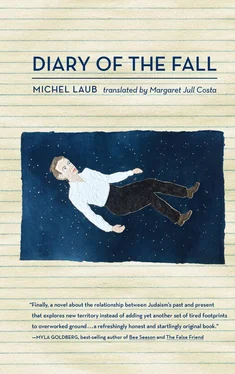30.
After I became friends with João, I started looking at my other friends, unable to understand why they had done that, and how they had managed to co-opt me as well, and I began to feel ashamed that I had ever shouted son-of-a-bitch goy , and this became mixed up with my growing feelings of discomfort around my father, a rejection of the performance he gave whenever he spoke of anti-Semitism, because I had nothing in common with the people he talked about apart from having been born Jewish, and I knew nothing about those people apart from the fact that they were Jews, and even though so many had died in the concentration camps it made no sense to be reminded of this every day.
31.
It made no sense that I had nearly left a classmate crippled because of that or because I had in some way been influenced by it — my father’s speeches like a prayer before each meal, solidarity with the world’s Jews and a promise that their suffering would never be repeated, when what I had been witnessing for months was the exact opposite: João alone against the mob, ignoring the humiliations, never giving the slightest indication of defeat when he was buried in the sand, and because of that memory and my awareness that he was not the coward, but rather the ten or fifteen of us boys surrounding him, because of that sense of shame that would cling to me forever unless I did something about it, I decided to change schools at the end of the year.
A FEW THINGS I KNOW ABOUT MYSELF
1.
There are various ways of interpreting my grandfather’s notebooks. One is to assume that he could not possibly have spent years devoting himself to the task, compiling a kind of treatise on how the world should be, with his interminable entries on the ideal city, the ideal marriage, the ideal wife, the wife’s pregnancy accompanied with diligence and love by the husband, and never once mention the most important event of his life.
2.
I read just a small part of the notebooks, and I was the only person to do so apart from my father. He had them translated after my grandfather died and never told my grandmother. I can even understand his reasons and even understand that this embarrassed him in a way, but right from the start, the effect they had on me was quite different.
3.
My father was a fairly keen reader. Yet despite that, I can only remember him mentioning perhaps ten books during my adolescence. Maybe no more than five. And the reason I can only remember the title of one of those five, If This Is a Man , which he acquired in a foreign edition, is because he was constantly reading out the descriptions of how a concentration camp worked, the nights Primo Levi had to share his bed with a watchmaker, the stories about high and low numbers, jobs, uniforms, soup.
4.
My father quoted from If This Is a Man during the first serious argument we had. It was in the second term of the year in which I had my bar mitzvah, when I told him I wanted to leave the school. By that time, things had already changed, I had severed all ties with my former friends. I didn’t even talk to them and had already become accustomed to being ignored by them too: from one day to the next, people start turning their back on you, they stop phoning or asking you so much as to lend them a pencil and, in the space of a week, you no longer feel able to talk about this with anyone, a state of affairs that can easily last for what remains of your school life, because there’s nothing more difficult when you’re thirteen than changing your label.
5.
At thirteen I was the student who had been summoned by the coordinator to talk about João’s fall. Before summoning the parents of the other boys involved, she had a talk with each of us, one by one, and I was the last. Her office was decorated with drawings that the younger children had done to celebrate the school’s anniversary. My classmates waffled on to her, praising everything they saw in the room, what lovely drawings, it’s amazing how creative children are nowadays, is that a cross or a plane? My classmates praised her clothes, her hair, her children’s smiles in the framed photos, and nine out of ten times they managed to get away without having to sign the disciplinary card.
6.
Three signatures meant a suspension, but in some cases the punishment was applied immediately: no classes for two days, which wasn’t so bad out of exam time, but obviously that wasn’t the only thing that changed the way I was viewed at school. It wasn’t just that the others who let João fall were punished. It was what happened at my meeting with the coordinator: I went into her room determined to say nothing, to keep repeating that it had been an accident, but she received me with a smile and offered me a cup of coffee and a piece of cake and started asking questions about João’s party, and I began to remember the party all over again, and she kept talking and I felt no desire to praise the drawings and the photos, and I was troubled by her gentle tone of voice, asking me if I thought that had been a safe, sensible game to play, if it had occurred to me that I might hurt my classmate, if I knew that his family had difficulties paying the school fees, and at a certain point her questions and the memory of João’s father at the party and the thought of him in the park selling cotton candy so that he could throw a birthday party where João would be humiliated by his classmates in front of his family became mingled with a feeling of faintness, and I began to think I was about to be ill, that I needed to lie down, needed air because the windows were all closed, and still she waited for an answer until she saw the blood drain from my face and then, almost at the same time as I was vomiting up the coffee and the cake and everything else I’d eaten during the previous two days, I told her that the story about the fall being an accident was a lie.
7.
My father asked what was wrong with school, and I felt unable to explain. I didn’t want to tell him that after being sick and then recovering in the coordinator’s office, I had told her all the details, about João being buried in the sand, about the plan to let him fall after we had given him the bumps, about everyone else who had been part of the plan and how we’d carried that plan out at the party. I didn’t want to tell him that the news was all round the school within half an hour, and that the whole of the seventh grade knew I had told on my classmates, and that the coordinator had suspended everyone except me, and that I had got away with just a warning.
8.
In other schools there was an admissions period that began in November, with written exams, an interview, a visit and a chat with the student’s parents. In Porto Alegre there were schools run by priests, by nuns, German schools, English schools, girls’ schools, crammer schools, and João had done really well in the tests for one particular school that had an excellent record when it came to getting its students through the university entrance exam, and so it was easy for his father to secure him a scholarship with an equally favorable discount.
9.
I never had the chance to go to a school like yours, my father said. I only ever studied in schools where there were no other Jews. I was the only Jew out of five hundred students, he said, and you don’t know what it’s like to spend the whole day studying, knowing that at any moment someone is sure to remember that. One day, someone notices you for the first time and what he sees is that you’re a Jew. Even if you make friends with everyone, that’s what they’ll always say. Even if you’re top of the class in every subject, that’s what they’ll always throw in your face.
Читать дальше












